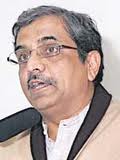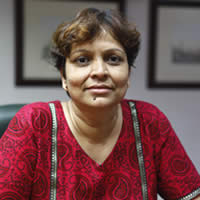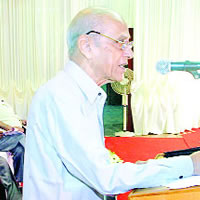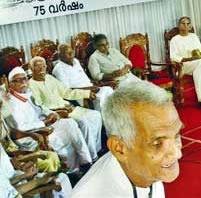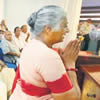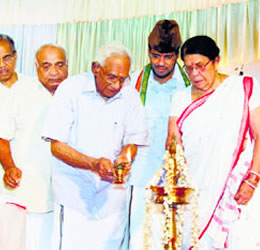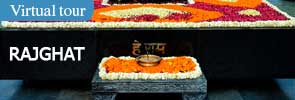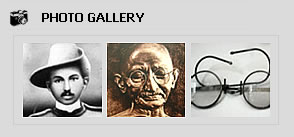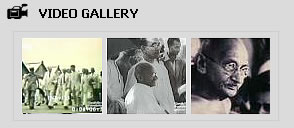`Rejecting Gandhiji's philosophy is worse than murder'
Giriraj Kishore Posted on: 14 Jul 2010
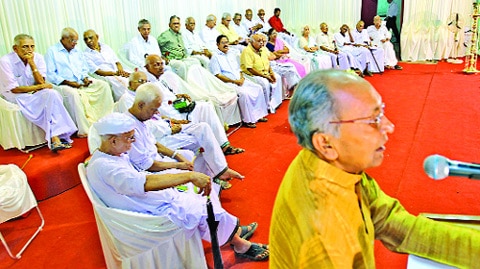
Chief guest Prof. K V Easwara Warrier, poet and freedom Fighter, Ms.O V Usha, Poetess and sister of renowned thinker and writer Vijayanji, Sh. K Setumadhvan, Dy. Editor and famous socialist and Chairman & MD of Mathrubhumi, Sh M. P. Veerendra Kumar
Mathrubhumi is a word which touches the strings of one's heart. When it is recited it becomes a Mantra. I understand that no where in the developed world is the expression 'land of one's mother' or Mathrubhumi is used for the country of one's birth. Generally, the expression used is 'father land.' I, as an Indian, get sentimental when 'Mathrubhumi' is used. Why?
Our country is forgetting the magic touch of mother India that prompted our previous generation to sacrifice everything to bring independence back and break the shackles of slavery. Mathrubhumi was founded in 1923 in the aftermath of Gandhi's non-cooperation movement in Calicut . The association of Mathrubhumi with Gandhiji's non-cooperation movement distinguishes it from other newspapers of India .
It reminds me of mothers getting up early in the morning and waking up their kids even as they are reluctant to leave their beds. This Mathrubhumi now wakes up those adults who are still dozing, though awake. I feel proud in mentioning that it was Late Sh. K.P. Kesawa Menon, a freedom fighter and activist in the freedom struggle against the British, who founded this great Institution. Today, Mathrabhumi is celeberating the 75th year of Mahatma Gandhi's visit to this place. I feel proud and humble to have been invited on this great occasion. I express my heartfelt gratitude to the management of Mathrabhumi for the same.
Sometimes, I ask myself what qualifies me to be invited to such a prestigious function? I am neither a Gandhian in the real sense, nor a freedom fighter like the founder of Mathrubhumi, late Sh. Kesawa Menon and the Chief Guest of today Prof. Warrier. Yes, my luck favoured me once since I got an opportunity of having a darshan of the great Mahatma in my childhood. I feel tempted to share this incident with all the friends present here. In 1947, when India earned its independence under the leadership of the Mahatma, I was a child studying in class six. I come from Muzaffarnagar, an agriculturally rich city in western UP around 120 km. north from Delhi .
It was a time when the whole country was under the grip of turbulence. Gandhiji was going to visit a refugee camp in Haridwar. In those days it was a general practice that whenever a high dignitary visited the city, the class teacher took the children to the place of his visit and made them stand in a queue to welcome the dignitary and probably also to enrich their knowledge and education. Our class teacher made us stand by the side of the GT Road from where Gandhi Ji was to pass. In those days children were given priority over adults; nowadays they are pushed back. As we waited, there first came a car at a high speed. People thought Gandhiji was in the car and they ran after it, but the car carried a lady wearing khadi.
Soon, a bus came with Ram dhun being recited inside. People surrounded the bus and started shouting slogans. The bus stopped. One person emerged from inside and announced: 'Bapu would not be seeing anyone at this hour.' But the people would not leave; they continued their shouting and insisted that they would not move an inch without Bapu's darshan. Eventually, Bapu had to appear at the bus window. As luck would have it, I was standing just below the same window. Afterwards, when I recalled the incident I realized that Bapu was perhaps tired and depressed. Looking at me, he said 'Forget Gandhi. You all are Gandhis now. Our country has got its independence. Make the country prosperous and strong.' All this is still engraved in my heart and soul. I was thrilled.
Words are insufficient to explain the experience which my adolescent mind then went through. This was my first face to face interaction with Mahatma Gandhi. My second source of interaction with Gandhi was my maternal uncle Acharya Jugal Kishore, a close associate of Gandhiji. After returning from Oxford University in 1920, my uncle was in close touch with Gandhiji. Many were the things that my uncle told me about Gandhi. If you permit me, I would like to share one incident narrated to me by him. It may interest you all.
Acharya was Principal of National College, Lahore where Bhagat Singh, Yashpal, a renowned writer of Hindi and a revolutionary, were his students. After the great Bhagat Singh and his three friends were sentenced to death, Acharya along with a few other colleagues went to Gandhiji and requested him to do some thing to rescue Bhagat Singh from the death sentence. By that time Gandhiji had approached the then Governor General thrice with no favourable outcome. Gandhiji asked Acharya one question: 'You have been his teacher. Tell me: Would Bhagat Singh agree to live a life donated to him by the British after death sentence has been pronounced by the court?' I have mentioned this incident only by way of information since it was part of the personal conversation between Gandhiji and Acharya. Moreover, there has been criticism that Gandhi did not make any effort to seek relief for Shaheed-e-azam. I hope the incident described here will help sensible people to understand the assessment Gandhi had of Bhagat Singh's mind. Like his guru Chandra Shekhar Azad, Bhagat Singh was not afraid of death.
Gandhi was a simple and straightforward person. At the same time, his politics was difficult to understand. Lord Irwin remarked about Gandhi: 'I came to have no doubt whatever that, if Mr. Gandhi gave me his word on any point, that word was absolutely secure, and I could trust it implicitly. On the other hand, I found, what had always been my impression, that though intentionally he was completely sincere, yet in some matters he was a victim of unconscious self delusion.' (Gandhi : Naked Ambition, by J. Adams p.194). 'Unconscious self delusion' appears to be contradictory to what he has said in the earlier two sentences.
While reviewing my novel The Girmitiya Saga, English version of the Hindi novel Pehla Girmitiya, Ms. Aparna Thomas has written In Amazon.com: 'I have always been in awe of Mahatma Gandhi. But I was also curious about what kind of experience could make him the Mahatma who created history. The Girmitiya Saga is a novel that will answer such questions.' I frankly admit that before writing Pehla Girmitia in Hindi I was also in awe of the Mahatma. He was considered to be a conventional Hindu as understood by Mr. Jinnah and Dr. Ambedkar. Both were great intellectuals of their times. He was such a Hindu who never worshipped in a temple or Haveli in spite of his mother's repeated insistence. Yet he went to the temples when he had to usher Harijans/dalits into those temples against the wishes of caste Hindus.
When I was writing the book Hind Swaraj - Gandhi ka Shabd Avatar in Hindi, which is currently being translated into English, I found that Gandhi was not against doctors or lawyers or machines or the Parliament. His intention was to underline the limitations of these professions/institutions in the context of our country, historically and traditionally.
When he talks about doctors and lawyers he is looking at the future of the country against the background of its past history. I need not elaborate the point since we all know that in the past mostly we, as the public, followed our rulers blindly in every field. Gandhi was in a way an anarchist, but he always believed in keeping one's windows open so that fresh air could enter one's house. He wanted that alternatives to everything should be available, whether it was law, medicine or even machinery. We must not burn our hamlets while waiting for Godot, when we are not aware what Godot has in store for us. Though he favoured parliamentary democracy, he wanted to point out its limitations: how it had functioned in the most developed democracy of the world. He asked whether we should follow that example or not? Eventually, we did follow it but probably in its worst form.
He criticized the European civilization severely. He called it Shaitani Sabhyata or Satanic civilization. He gave arguments in support of his view. European civilization, he said, was the outcome of industrialization in Europe . India , in fact the whole of Asia , being an agricultural region, the western model of civilization may affect life here adversely.
Citizens alien to such a civilization may remain hanging between two worlds, getting the worst of both. He also felt that, under such conditions, indigenous alternatives should not be excluded. For example, electricity has become very much a part of the common man's life and we are cut off from indigenous means of energy. In the north, we are feeling severe scarcity of energy. We are now searching for alternative sources of energy and water. But we don't seem to be getting anywhere with our search. We did not listen to Gandhi. We thought that addiction to borrowed comforts was a permanent cure for our difficulties. But it was not a solution for the common man. Gandhi always said: if you want to assess your gains always look towards the last person standing in the line. Did we do that? Of course, we didn't. Although I am short of time, I would like to invite your attention to Gandhiji's affirmation: 'My life is my message.'
The question that has always bothered me is this: Have we tried to know what his life was? We do not know even an iota about his life yet we are out to reject him. Why? Because he is a difficult touchstone for all of us - politicians, professionals, educationists, servants and others - we considered it to be a safest way to reject him. 'Him' means his philosophy of life. If you decide not to apply your mind to any of the questions, rejection becomes very easy. We may not reject his life, but reject his life's philosophy, which is of course worse than murder. Common men knowingly or unknowingly still live with Gandhi as the ideal. It helps them to survive in spite of the tough struggle of life because they have learnt the importance of patience, tolerance and faith which were central to Gandhi's principle of Ahimsa. In South Africa , one old man told me that Gandhi had taught them to march forward against all odds as they had seen satyagrahis facing the guns of Gen. Smuts and the guns finally bowing down before them.
There is a saying in our part of the country: Hari anant Hari Katha Ananta. It is applicable in respect of Gandhiji's life. Experience-wise the story is so vast that it becomes difficult to swim across. I am a very small man. I cannot boast that I know everything about his life but some sparks while writing Pehla Girmitiya on Gandhi's South African life, may have touched me.
In the end, I again express my deep gratitude to the management of Matrubhumi that they invited me to be present here and sit by the side of such great scholars, freedom fighters, poets and writers. Since a socialist of the stature of Sh. M. P. Virendra Kumar is present here, I wish to mention for his information that we are soon bringing out a special number on Dr. Ram Manohar Lohia on his centenary year of Akar, a Hindi journal, of which I am the honorary editor. I am proud that I had the opportunity of working with Lohiaji during the 60's. Actually, he inspired me to become a writer. I pray that Mathrubhumi may prosper by leaps and bounds and spread all over India in all languages.
(Mr Giriraj Kishore is writer and former head of Centre for creative writing and publications wing of IIT Kanpur)











